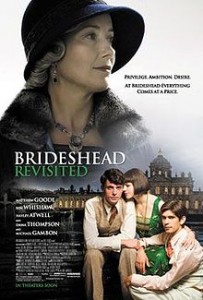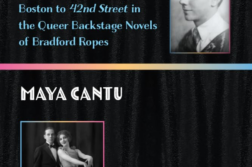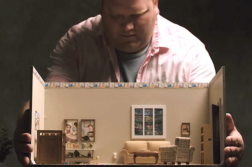 Brideshead Revisited
Brideshead Revisited
Directed by Julian Jarrold
Miramax Films
LATE IN EVELYN WAUGH’S Brideshead Revisited (1945), narrator Charles Ryder finds himself trapped in a loveless marriage and still in love with a married woman, Lady Julia Mottram, whose physical likeness to her brother Sebastian is what Charles has been drawn to all along. Indeed, behind each of Charlie’s lovers lurks the specter of a healthy and happy Lord Sebastian who, by the novel’s end, has descended into dipsomania and depression because of the shame associated with his homosexuality. “You loved him, didn’t you?” Julia asks. “Oh yes,” says Charles. “He was the forerunner.” There’s an important pause, and then: “Julia understood.” What’s also implicitly understood in a scene like this one is Waugh’s reluctance to categorize the men’s attachment as either gay or straight. Their earlier romance took place within what Charles recalls as the “languor of Youth” with all its “zest, the generous affections, the illusions, the despair.”
 The TV miniseries from 1981 plays it similarly safe on the score of sexuality. Anthony Andrews brought a handsome hauteur to the role of Sebastian Flyte, but he’s more dashing than dandyish, and a young Jeremy Irons, who, even at 33 looked quite 47, lacked the necessary zest to make the Oxford days look really believable. Still, fans of the BBC version, which also included such late greats as Sir John Gielgud and Laurence Olivier, consider it the only adaptation worth revisiting. This is why the theatrical release last summer of Julian Jarrold’s Brideshead Revisited was a risky move by the director of Kinky Boots and the Jane-Austen-inspired Becoming Jane. Perhaps predictably, the film was not all that critically well received.
The TV miniseries from 1981 plays it similarly safe on the score of sexuality. Anthony Andrews brought a handsome hauteur to the role of Sebastian Flyte, but he’s more dashing than dandyish, and a young Jeremy Irons, who, even at 33 looked quite 47, lacked the necessary zest to make the Oxford days look really believable. Still, fans of the BBC version, which also included such late greats as Sir John Gielgud and Laurence Olivier, consider it the only adaptation worth revisiting. This is why the theatrical release last summer of Julian Jarrold’s Brideshead Revisited was a risky move by the director of Kinky Boots and the Jane-Austen-inspired Becoming Jane. Perhaps predictably, the film was not all that critically well received.
This new Brideshead takes real liberties with the original text, and instead of duplicating the original dialogue more or less line-for-line—the 1981 version is nearly eleven hours long—the newer Brideshead succeeds in recreating the halcyon mood, the “languid days,” as Waugh put it, of both Oxford and Brideshead. Jarrold’s update is also more forthcoming where Sebastian’s closet is concerned. The source of his incapacitating guilt, after all, is that he’s the ultimate outsider within Britain’s upper class—both Catholic and gay. Charles, on the other hand, is an avowed atheist and a stranger to aristocracy, and after having the gates of Oxford opened to him, he’s given a tour by his cousin Jasper who cautions Charles to “beware of the Anglo-Catholics,” for “they’re all sodomites with unpleasant accents.”
Ben Wishaw as Sebastian does a fine job at fulfilling all of cousin Jasper’s fears. He also plants a kiss on Charles while wine-tasting out in front of Castle Howard. “There’s a kiss,” Jarrold told The Advocate (5/20/08), “that isn’t in the book.” (Neither is the skinny-dipping that takes place in the fountain at Brideshead.) Aided by Terry Davies’ seductive score and the BBC Philharmonic Orchestra, Jarrold attends more faithfully to the same-sex romance at the heart of Waugh’s novel. Sporting a silver wig and looking as bloodless as Meryl Streep in Doubt, Emma Thompson as the formidable Lady Marchmain brings a dignified sort of despair to the scenes in which she pleads with Charlie Ryder to help set her Sebastian straight. Certainly much has been lost through Jarrold’s radical abridgment of Waugh’s most popular novel, but there’s plenty to gain as well when we re-examine the world of Brideshead through the prism of Sebastian’s suffering.





